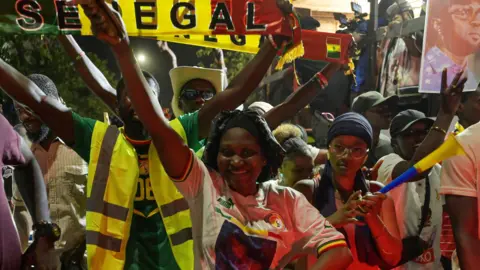Senegal's radical government claims 'large victory' in legislative polls
 AFP
AFPThe Senegalese government has claimed victory in Sunday's parliamentary elections with most of the votes already counted.
It said the ruling party, Pastef, had won with a "large majority".
A victory for Pastef would give President Bassirou Diomaye Faye a strong mandate to implement the radical agenda of economic and social reform on which he was elected in March.
Former President Macky Sall, Prime Minister Amadou Ba and Dakar's mayor Barthelemy Dias, who were heading different opposition coalitions, have all accepted defeat.
Official results are expected later on Monday.
The vote was conducted peacefully across the country on Sunday, although there were sporadic clashes between supporters of different parties in the run-up to the elections.
"We are proud of the Senegalese people and we would like to thank them for the large victory that it has given to Pastef," government spokesman Amadou Moustapha Ndieck Sarre told the BBC.
Pastef has not said how many seats it has won. It needs 83 for a majority in the 165-seat National Assembly.
Faye and his Prime Minister Ousmane Sonko had struggled to get their reforms passed in recent months in the opposition-dominated parliament.
Faye appointed Sonko, his political mentor who was barred from running for the presidency, as his prime minister soon after he became president.
The pair campaigned on a promise of radical change - with an Afrocentric and nationalist agenda, promising to reset Senegal’s relationship with France, the country’s former colonial power.
President Faye, Africa's youngest elected leader aged 44, promised economic reform, social justice and a focus on anti-corruption which resonated with many young people.
The new government is likely to still face significant challenges in a country wracked by high levels of unemployment and shaky public finances.
You may also be interested in:
 Getty Images/BBC
Getty Images/BBCGo to BBCAfrica.com for more news from the African continent.
Follow us on Twitter @BBCAfrica, on Facebook at BBC Africa or on Instagram at bbcafrica
